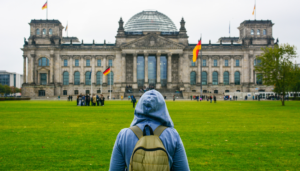Germany’s immigration reform for 2024 is a comprehensive overhaul aimed at addressing the country’s economic and demographic needs. The focus on skilled labor immigration highlights Germany’s strategic approach to sustaining and growing its economy, these reforms are set to significantly impact the landscape of immigration and integration in Germany. Below is an overview of the changes that come into effect throughout 2024.
-
Easier Immigration for Skilled Workers
The German government has acknowledged the acute need for skilled workers in various sectors, particularly following the COVID-19 pandemic which exacerbated staffing shortfalls in industries ranging from skilled trades to nursing care. In response, the 2024 reform aims to streamline the immigration process for these workers, focusing on reducing excessive bureaucracy and facilitating a quicker settlement process in Germany. This initiative is part of a broader strategy to bolster the German economy by filling crucial skill gaps and is seen as a critical step towards maintaining Germany’s competitive edge in the global market. The reform is expected to be particularly beneficial for professionals in high-demand sectors, offering them a more straightforward path to employment and residency in Germany. The government’s approach underscores a clear message: skilled workers are not only necessary for economic recovery post-pandemic but are also integral to the long-term growth and sustainability of the German economy.
-
New Points System for Immigration
The introduction of a points-based system represents a significant shift in Germany’s approach to immigration. This system will evaluate potential immigrants based on their language skills and professional experience, thereby ensuring that those who are most likely to contribute positively to the German labor market are prioritized. The granting of a one-year visa under this system provides immigrants with sufficient time to seek employment in Germany. This approach aligns with Germany’s strategic goal of attracting highly skilled workers who can immediately integrate into and bolster the workforce. It’s a proactive measure to address labor shortages, especially in sectors that are essential for Germany’s economic stability and growth.
-
Lower Income Requirements and Family Immigration
Lowering the income requirements for immigration and easing the process for family members to accompany the primary applicant are steps taken to make Germany a more attractive destination for skilled professionals worldwide. This change is particularly significant as it acknowledges the importance of family unity in the decision-making process of potential immigrants. By facilitating the immigration of family members, Germany is not only enhancing the appeal of its labor market but also promoting a more inclusive and family-friendly immigration policy. This move is likely to encourage more skilled workers to consider Germany as a viable and desirable long-term destination for both professional and personal growth.
-
Direct Work Opportunity for Non-EU Foreigners
Allowing non-EU foreigners to start working in Germany while their qualifications are being approved is an innovative approach to reduce waiting times and bureaucratic hurdles. This provision, which permits a stay of up to three years including dependents, as long as the immigrants can support themselves, is a clear indication of Germany’s commitment to harnessing global talent. This flexibility is particularly beneficial for skilled workers who may otherwise face lengthy delays in the recognition of their qualifications, allowing them to contribute to the German economy more rapidly. This measure not only benefits the workers but also German industries that are in urgent need of skilled labor.
-
Expanded EU Blue Card Scheme
The expansion of the EU Blue Card scheme to include sectors facing labor shortages is a strategic move to address specific skill gaps in the German labor market. The Blue Card, which already offers favorable conditions for permanent residence and job changes, becoming accessible to more sectors, underscores Germany’s recognition of the critical need for skilled labor in areas like healthcare and education. This expansion is expected to attract a diverse range of professionals, thereby enriching the German workforce with essential skills and expertise.
-
Simplified Recognition of Foreign Qualifications
The reform simplifies the process of recognizing foreign qualifications, significantly easing the path for skilled workers to enter the German labor market. This change is particularly important as it removes a major barrier that previously deterred many qualified professionals from seeking employment in Germany. The option to have qualifications recognized after entering Germany is a pragmatic approach, reflecting Germany’s understanding of the global nature of the workforce and the need to facilitate a smoother transition for skilled immigrants. This flexibility benefits both the workers, who can start their employment sooner, and the employers, who can fill their skill gaps more quickly.
-
Increased Immigration for Education
Germany’s focus on increasing immigration for educational purposes reflects a long-term vision to foster a highly skilled workforce. By making it more attractive to come to Germany for vocational training or university degrees, and encouraging graduates to stay post-graduation, Germany is investing in a pipeline of skilled workers who are familiar with the German system and potentially more integrated into its culture and language. This approach not only enriches the educational landscape in Germany but also ensures a steady flow of qualified professionals into the German labor market.













